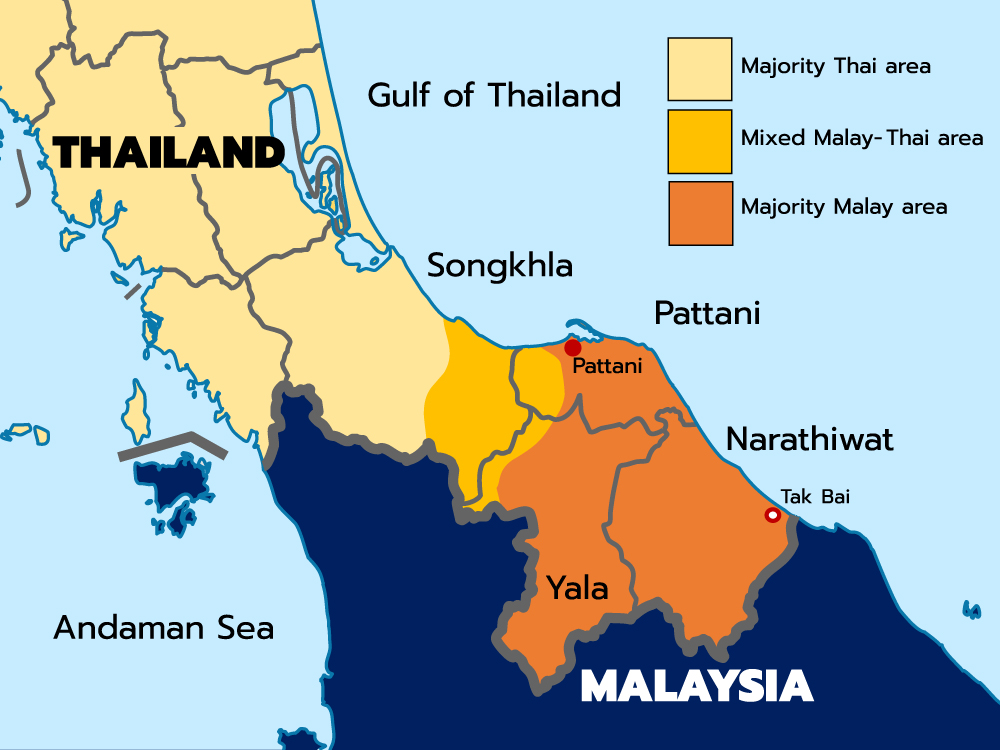
One of the most challenging security policy issues that Thailand’s current government, led by Acting Prime Minister Phumtham Wechayachai (as of late July 2025), faces is the lack of a clear strategy for the ongoing Malay-Muslim insurgency in Thailand’s southernmost provinces, which has raged since 2004. This article aims to identify the most important political factors hindering a peaceful solution and suggests a new approach that addresses these obstacles more directly than in the past.
A first major obstacle is Thailand’s ruling conservative elite (political and bureaucratic), which has little interest in substantially altering the centralized bureaucratic power structure or make substantial cultural concessions in the Muslim South. On the contrary, the decade-long conflict and the huge amount of military resources spent in the region, has allowed the emergence of a sinecure which is monopolized by a network of military top brass, who have also entered into politics via the Senate. The power and financial resources of this self-enriching network depend on continued violence, representing an equally powerful blockade against peace as the insurgents themselves.
Another major obstacle to peace in Southern Thailand is the strength of the leading insurgent group, Barisan Revolusi Nasional (BRN). BRN’s leadership believes that the longer the conflict lasts, the greater the potential political gains for BRN, possibly even opening doors to independence (merdeka) for Patani. A growing civil movement for a referendum for independence in the South and international support for peace talks (led by Switzerland and Germany) fuel these hopes. Most importantly, however, is that the Thai military has not been able to effectively counter BRN’s underground network over the last 20 years.

On the contrary: BRN has systematically radicalized thousands of young people using a mix of nationalist and jihadist ideology. The group has a strong support base in schools, rural and urban areas, social media, and even government organizations. It continues to generate necessary resources through membership fees and business activities on both sides of the Thai-Malaysian border. While the Thai military controls the surface situation, it has lost the struggle against BRN’s “underground apparatus.” There are still wide areas in the Deep South where civilian government officials do not dare go without armed support, indicating the real state of affairs.
Another key to understanding BRN’s strength is that its leadership (and mid-level commanders) mostly reside undisturbed in Malaysia with tacit support from various government actors in Kuala Lumpur, especially Malaysia’s Special Branch Police. This support is rooted in distrust of Thai actions against their ethnic Malay kin. However, many Thai government officials believe Malaysian officials have an intrinsic will to weaken Thailand via the South. Bilateral relations between both countries, crucial to solving the conflict, have been neglected for many years. Given Malaysia’s recent active role as the current ASEAN Chair and a mediator in regional conflicts, there may be a renewed opportunity for enhanced cooperation on this critical issue.
These factors explain the lack of substantial progress in peace talks between the Thai government and rebels hosted by Malaysia. Past Thai governments, including the former Prayuth administration, continued peace talks more out of fear of international repercussions than hope for a solution. Equally, BRN’s real leadership, assuming that the time was not ripe for real negotiations yet, has always avoided an active participation in the talks. Instead the group sent former members without power, to join the discussion table as a means to gain time.

A fundamental flaw in peace talks is assuming that regular discussions alone will lead to trust and progress (“escalator logic”). This normative view of peace talks is prominent among scholars, NGOs, the Foreign Ministry of Germany and Switzerland, as well as the intellectuals in National Security Council of Thailand. However, equally significant is a pragmatic approach that recognize that the reality of the above-described power relations are opposed to such an outcome. A realistic peace in the South can not only be based on a vague hope for a new era of political reform and the self-fulling logic of peace.
Instead the key to peace may lie in a new strategy in which the government substantially weaken BRN as an insurgent organization before peace talks can succeed. For example, it is often forgotten that the successful negotiations between the British government and the IRA was preceded by substantial weakening of the IRA (public support for the group fell following some miscalculated devastating bomb attacks, while its leadership was widely infiltrated by British intelligence). Eventually, parts of IRAs leadership realized that it could not realistically achieve its aims and thus joined the peace talks, while the Blair government manifested a sincere will for finding a peaceful solution.

The Thai government must take various measures – abroad and at home – to achieve conditions for successful peace talks: (1) a clear national counter-violent extremism (CVE) plan that systematically counters the radicalization of local youth by BRN; (2) a counter-insurgent financial strategy that ends the flow of BRN’s essential resources; (3) a security and safety approach with an active focus on BRN’s underground networks that is led by Thai police – not the military; (4) a replacement of the entrenched Thai military elite in the Deep South; (5) a counter-insurgency approach that respects human and political rights, i.e. an immediate end of torture, killings and harassment by government officials; (6) a foreign policy that has the clear goal to convince Malaysia to stop being a host to BRN leadership.
Currently, there is a window of opportunity: Malaysia currently holds the ASEAN Chairmanship, having officially taken over from Laos on October 11, 2024. Prime Minister Anwar Ibrahim has expressed a vision of unity and collaboration for ASEAN during this tenure, emphasizing the need to address geopolitical challenges and promote regional stability. Thailand’s current government has the chance to introduce a strategy aimed at weakening BRN. The weaker BRN is, the fewer political concessions Thailand would have to make during negotiations. Hence, a negotiation agreement could emerge that stands a realistic chance of being accepted by Thailand’s conservative elites.
Sascha Helbardt, PhD
Sascha Helbardt is an independent researcher.
